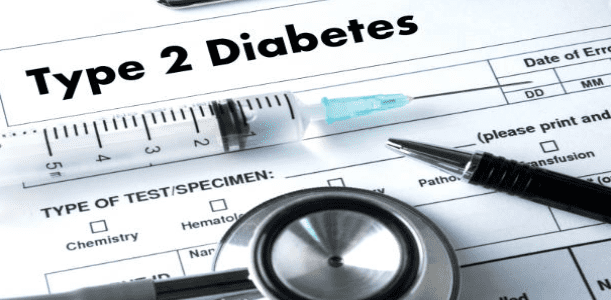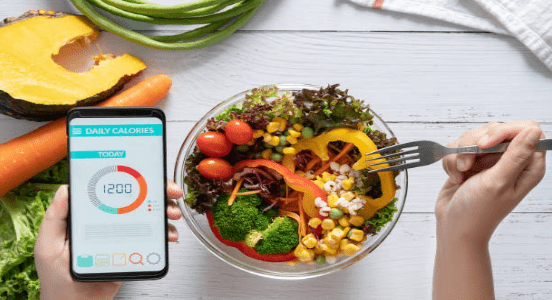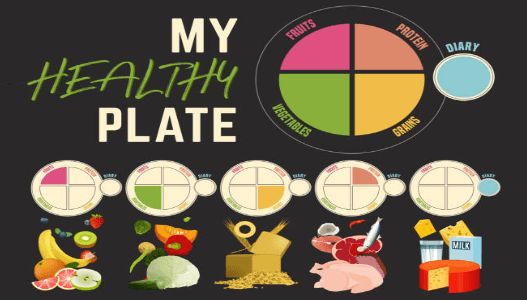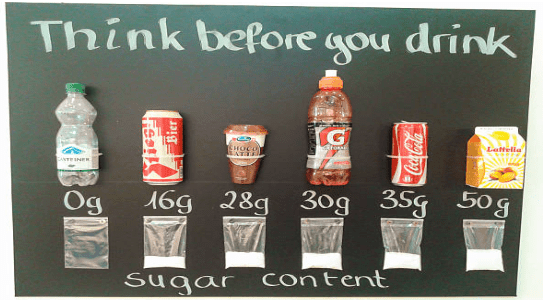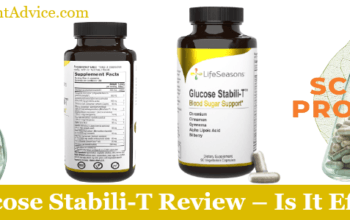
Let's talk about how to prevent diabetes (type 2).
Diabetes is a problem for millions of people worldwide.
So in this article, we're going some things that can help you keep it under control:
- the real causes of type 2 diabetes
- some tips to prevent and delay type 2 diabetes
- other essential things you need to know about it
Moreover – the aim of this article is to help you overcome your worries about this condition.
Note: This article includes references and studies related to Type 2 Diabetes.
How To Prevent Diabetes (In A Nutshell)
As you know – there are several causes behind type 2 diabetes.
The most common reasons are genetics or family history.
Sugars and honey don't cause this condition, contrary to popular belief.
So far – there are a few treatments available, but there's no cure for type 2 diabetes.
But you can delay it by doing some lifestyle changes.
Shortly – here are 4 essential tips to prevent type 2 diabetes:
- Stop consuming sugary drinks as much as possible
- Manage and control your overall weight
- Consume less foods with a high carbohydrate content
- Avoid a sedentary lifestyle and start doing physical activities
Additionally – you should know that following those tips will not prevent type 2 diabetes completely.
But you can delay it in up to 80% of cases, which is still better than nothing.
As I said – type 2 diabetes is a chronic disease.
So the best things to manage the symptoms and delay them are healthier routines.
In this way, you can keep your blood glucose at healthy levels.
Also, I recommend finding a good diabetes/blood sugar supplement such as Gluco Cleanse Tea.
So look for a product that contains the top form of cinnamon, a pure extract of Banaba, as well as essential minerals.
According to studies, these substances are extremely helpful for diabetes.
In addition, they are beneficial for regulating blood sugar levels.
Overall, a good lifestyle routine and a high-quality supplement will definitely help you prevent type 2 diabetes.
What Is Type 2 Diabetes?
Firstly – type 2 diabetes is a chronic metabolic disease [1].
Basically, it occurs when your blood glucose level is too high.
So normally, a hormone called insulin helps glucose to get into your cells [2].
But in people with type 2 diabetes, the level of insulin produced isn't enough or it's not used correctly.
This leads to way too much glucose that stays in the blood.
This is called insulin resistance.
Now – there are several factors that contribute to the development of type 2 diabetes [3]:
- Genetics or family history
- Obesity and sedentary lifestyle
- Age and ethnicity
- History of gestational diabetes or prediabetes
Based on the points above, type 2 diabetes cannot be prevented entirely.
This mostly happens if you have a family history.
But the good news is that it can be delayed in up to 80% of cases [4].
Now – there are a lot of tips to help you avoid the triggers of type 2 diabetes.
But I'm going to give you the 4 major steps that are scientifically proved.
Tip #1 – Control Your Weight
According to some studies, being overweight is one of the risk factors for type 2 diabetes [5].
Here's why excess weight is a key factor in this health condition:
- it causes chronic inflammation in the body
- the excess abdominal fats release fatty acids
- it can sometimes lead to hormonal changes
All of the triggers above can interfere with the proper functions of insulin.
As a result, your body will find it harder to use insulin effectively, which will lead to insulin resistance [6].
With this in mind, let me give you some important tips to help you control your weight [7]:
- Follow a balanced diet by focusing on foods rich in healthy fats and lean proteins.
- Avoid processed foods, foods high in saturated fats and sugary beverages.
- Get enough sleep, since a lack of sleep can affect your hormones.
- Watch your portion size by using a smaller plate to measure and keep your portions in check.
- Do not eat too much food (even healthy foods).
- Check your weight at least once a week, for a better monitoring.
Surely – the tips above sound too much right away.
But you can start one step at a time, in order to avoid unwanted side effects caused by sudden weight loss [8].
So if you have type 2 diabetes or you want to prevent it, managing your weight is very important.
Tip #2 – Be Physically Active
As I said, one of the problems of people with type 2 diabetes is insulin resistance.
Some studies mentioned that having a sedentary lifestyle can increase the risk [9].
So here are the downsides of sedentarism:
- sitting or lying down can slow down metabolism [10]
- lack of exercise can lower muscle cell's sensitivity to insulin [11]
- increases trunk and body fat percentage, while decreasing skeletal muscles [12]
- triggers health complications(heart disease, kidney failure and blood vessel damage)
Undeniably, a lack of physical activity doesn't only worsen type 2 diabetes.
It can also be the root of other health problems.
In order to avoid these issues, here are some steps to start your regular physical activity [13]:
- Start by finding the exercise that will fit your schedule.
- Set realistic goals by starting 30 minutes a day or light training 2-3 times a week.
- Consult a healthcare professional to get the right exercise set for your health condition.
- Make it a habit of including your physical activities as part of your daily routine.
- Stay motivated by finding a workout buddy, joining a fitness class or downloading a fitness app.
Overall – any physical activity is better than none at all.
You can always start small and then increase your activities whenever you're comfortable.
Just remember to stick to your goals and improve your overall health.
By doing so, you can delay and prevent type 2 diabetes.
Tip #3 – Reduce Your Carb Intake
Firstly – let's talk about carbohydrates.
They are molecules that play some important roles in providing all cells with energy [14].
Commonly – carbs are known as sugars, fibers and starches [15].
Here are the effects of an excess carbohydrates intake on the body [16]:
- uncontrollable weight gain
- poor metabolic health
- increased risk of heart disease
- hypertension and stroke
In general, cutting the intake of carbohydrates is not that easy.
But I will give you a few tips to reduce your intake without completely avoiding carbs [17]:
- Focus on increasing protein intake to help you feel fuller for longer periods.
- Eat more fiber-rich foods (beans, whole grain bread, fruits, nuts and cereals).
- Control your carb consumption by paying attention to portion sizes.
- Try brown rice, quinoa or bulgur instead of potatoes and white rice.
- Switch to whole-grain pasta or products made of beans/legumes.
I'm not saying that you should avoid consuming carbohydrates totally.
In fact, they are an important source of energy for your cells to function properly [18].
Just find a perfect balance and choose the right type/source of carbohydrates.
Tip #4 – Avoid Sugary Beverages
According to one study, people who consume sugary drinks have a greater risk of developing type 2 diabetes [19].
The reason is because of the calorie content of those beverages.
So what are the examples of sugary beverages you can easily find in the market?:
- soda and cola
- fruit punch and tonic
- sweetened powdered drinks
- sports and energy drinks
- beer and cocktails
Unfortunately, the added sugars in those sweetened drinks are quite high [20].
Some of them include dextrose, maltose, sucrose, lactose, corn and malt syrups.
For that reason, here are the alarming effects of beverages that are high in sugar [21]:
- weight gain and obesity
- cardiovascular and kidney diseases
- non-alcoholic liver disease
- tooth decay and cavities
- gout
- increased risk of type 2 diabetes
Again – one of the results of gaining weight is that your body will find it hard to respond to insulin.
So an excessive amount of sugary drinks leads to a spike in your blood sugar levels.
In this cases, the chances of getting type 2 diabetes are higher [22].
With that, here are some helpful tips to help you avoid sugary drinks as much as possible [23]:
- Drink more water (opt for colder water if you're very thirsty).
- Try plain beverages like milk, tea or coffee.
- Choose drinks without added sugar (unsweetened versions).
- Make it a habit to read the nutrition labels on the drinks.
- Don't replace soft drinks with instant fruit juices, since they also contain a high amount of sugar.
- Sweeten your drinks with natural sweeteners like stevia or monk fruit.
- If you crave a sweet drink, try healthier alternatives (natural coconut water and fresh fruit juices).
- Beer and cocktails also contain a high amount of sugar, so try to avoid them.
Again – it's not very easy to cut sweet drinks from your diet right away.
But you can start by choosing the low-calorie version of those drinks.
After your palate adjusted, you can gradually switch to healthier options.
But the best, safest and healthiest alternative is water.
It won't raise your blood glucose levels, thus reducing the risk of type 2 diabetes [24].
Best Diabetes/Blood Sugar Supplement
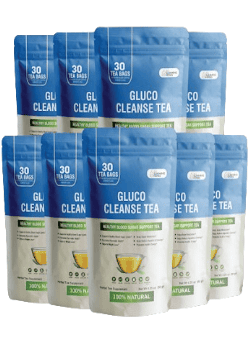
But including a good product for your wellness journey is also very important.
So let me recommend the best diabetes/blood sugar supplement I know.
Name: Gluco Cleanse Tea by Gluco Cleanse
Best Actual Price: $69 (lowest price is $49/pack)
Cheapest Place To Buy: Its official website
Designed For: Promoting healthy blood sugar levels.
Why do I recommend it?: Its topnotch features are incomparable to other diabetes control products:
- contains powerful herbs that are effective in regulating blood sugar levels
- effectively manages diabetes and its symptoms
- has a low risk of alarming side reactions
- many users swear by it (90% success rate)
- comes with a very practical price tag
So if you're looking for a supplement that will give improve your diabetes significantly, go for Gluco Cleanse Tea.
It has the best formula for managing blood sugar levels.
Its ingredients are famous for preventing type 2 diabetes.
Overall – it's the best diabetes/blood sugar supplement at the moment.
Final Conclusion
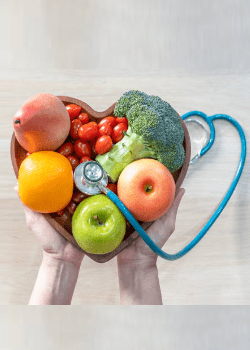
Until now, it can't be cured completely.
But you can prevent or delay it in even 80% of cases.
You can start by doing some lifestyle changes.
With that, here are 4 major tips to help you get started in managing your blood sugar levels:
- Look after your weight
- Engage in physical activities
- Lower your carbohydrate intake
- Stay away from drinks that are high in sugar
Again – changing your lifestyle can have a very big impact on your health.
So don't underestimate your effort and always stick to your goal.
Starting with small steps is better than not doing anything at all.
Also – try to find a helpful diabetes/blood sugar supplement that would keep a healthy blood glucose level.
The product I trust completely is called Gluco Cleanse Tea.
It's very effective for most people with diabetes and high blood sugar.
Because of its high-quality formula, it makes a great addition to your health and wellness journey.
References:
1 – https://www.who.int/health-topics/-diabetes/
2 – https://www.niddk.nih.gov/health-information/diabetes/-type-2-diabetes/
3 – https://www.niddk.nih.gov/-health-information/diabetes/-risk-factors-type-2-diabetes/
4 – https://www.cdc.gov/diabetes/-prevent-type-2-diabetes/
5 – https://www.ncbi.nlm.nih.gov/-pmc/articles/-PMC3206399/
6 – https://www.ncbi.nlm.nih.gov/-pmc/articles/-PMC4259868/
7 – https://diabetes.org/healthy-living/weight-loss/-extra-weight-extra-risk/
8 – https://www.ncbi.nlm.nih.gov/books/-NBK221839/
9 – https://www.ncbi.nlm.nih.gov/-pmc/articles/-PMC4364419/
10 – https://www.diabetes.org.uk/-sitting-for-long-periods/
11 – https://www.ncbi.nlm.nih.gov/-pmc/articles/-PMC5569266/
12 – https://www.ncbi.nlm.nih.gov/-pmc/articles/-PMC8760762/
13 – https://www.cdc.gov/diabetes/managing/-active/
14 – https://www.ncbi.nlm.nih.gov/-pmc/articles/-PMC4224210/
15 – https://www.hsph.harvard.edu/nutritionsource/-carbohydrates/
16 – https://www.hri.org.au/health/your-health/nutrition/-all-about-carbs/
17 – https://www.ncbi.nlm.nih.gov/books/-NBK279012/
18 – https://pubmed.ncbi.nlm.nih.gov/-29083823/
19 – https://www.hsph.harvard.edu/-nutritionsource/-healthy-drinks/
20 – https://www.cdc.gov/nutrition/data-statistics/-sugar-sweetened-beverages-intake/
21 – https://www.health.harvard.edu/heart-health/-sweet-danger-of-sugar/
22 – https://www.hsph.harvard.edu/-news/press-releases/-drinking-sugary-beverages/
23 – https://www.diabetes.org.uk/-preventing-type-2-diabetes/
24 – https://pubmed.ncbi.nlm.nih.gov/-34186361/


